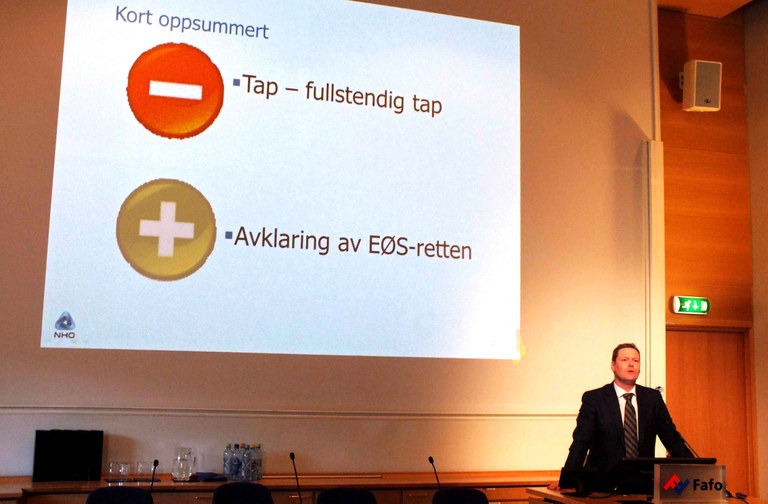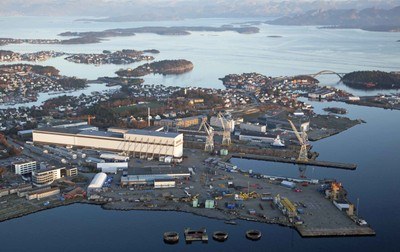Norway has its Laval judgement - but this time the union won
On 5 March Norway’s Supreme Court passed judgement in what in Norwegian has become known as ‘verftsaken’, or the shipbuilding case. The judgement has been called the most important win for the Norwegian Confederation of Trade Unions (LO) in recent times. Losing this case could have been as significant for the fight against social dumping as the Laval case in neighbouring Sweden.
The shipbuilding case will probably be called the STX Norway case within European labour law because the South Korean owned shipbuilder was first of a total of nine companies which took the Norwegian state to court in 2009.
“The Supreme Court judgement means all the objections raised against the Norwegian practice of making collective agreements universally applicable have been dismissed once and for all,” says the LO’s lawyer, Håkon Angell.

Defeat - an utter defeat - reads the overhead picture during Kurt Weltzien's presentation.
Until 2008 there Norway had a system where foreign labour was often hired in through a Norwegian daughter company. The daughter company employees only got jobs if they moved to Norway, and were thus regarded as locally employed.
In reality they were working shifts and were expected to commute back and forth between Norway and their home country. They would stay in barracks while they worked at the shipbuilder’s. While the collective agreement for the shipbuilding industry in 2008 secured workers at least 120 Norwegian kroner (€16) an hour for unskilled labour and 126 kroner (€16.8) for skilled labour, only 50 kroner would be left after foreign workers paid for travel, food and lodgings. In reality the foreign workers only made between 70 and 76 kroner (€9.30 and €1.13) an hour.
When the state Tariffnemda (the tariff committee) made the collective agreement universally applicable within the shipbuilding industry, employers were forced to pay the costs incurred by the hired workers by getting to the workplace as well as for their food and lodgings.
Nine Norwegian shipbuilders took the state to court in 2009, with support from the employers’ unions the Federation of Norwegian Industries and the Confederation of Norwegian Enterprise (NHO). They claimed making the collective agreement universally applicable was in breach of the EEA agreement.

Bergen Group Rosenberg is one of the eight Norwegian shipbuilders who took the state to court. Photo: Bergen Group
The STX Norway case spent four years in Norway’s legal system, with input from the EFTA Court.
Similar to the Laval case
“The shipbuilder case is in many ways as important to Norwegian labour law as the Laval case was for the Swedish, although there are major differences. The largest one is to understand that it was the trade union which won in Norway, and not the employers, like in the Laval case,” says Line Eldring at the Fafo Institute for Labour and Social Research, who has done a lot of research on social dumping.
In Sweden, a Lithuanian company, Laval, had won a new contract to renovate a school. The Swedish Building Workers’ Union demanded that Laval should pay wages according to collective agreements, and called for a blockade of the company. Laval claimed, with support from their Swedish employers, that Lithuanian wage levels and collective agreements covered posted workers.
The Building Workers’ Union lost the case, which ended up in the Court of Justice of the European Union. The Swedish Labour Court forced the union to pay 550,000 Swedish kronor (€65,700) in damages and costs of more than two million kronor (€239,000). The judgement is now being criticised by the ILO.
Within EU employment law the Laval case has been interpreted as if the Court of Justice of the European Union came down in favour of the service providers, and that the kind of demands raised by the Swedish Building Workers’ Union were in breach with the principle of freedom of movement. Catherine Barnard described the Laval case as opening up a Pandora’s box. She wrote what many consider to be the standard tome on European labour law.
“The court seemed to consider the fact that the company was located in a place with lower labour costs as a comparative advantage, and that that advantage should be protected by the principle of freedom of movement,” she writes in ‘EU Employment Law’.
If the eight Norwegian shipbuilders and the NHO thought the Norwegian Supreme Court would share the EU court’s view, they were mistaken. When Fafo organised a seminar about the STX Norway case, the lawyer for the employers, Kurt Weltzien, kicked off by openly declaring:
“It was a defeat - a complete and utter defeat for the employers,” he said.
Law and order
The Supreme Court established that it is within each individual country’s jurisdiction to defend the existing negotiation model, as this can be interpreted as upholding law and order.
“There are arguments put forward there which probably are of interest for other Nordic countries. This judgement can become a reference, but the Norwegian judgement will not have any direct effect on labour law in other countries,” said Line Eldring.

Jon Erik Dølvik, Fafo; Pål Wennerås, state lawyer; Liv Kristiansen, LO and Kurt Weltzien, NHO’s lawyer, in a debate on the judgement in the shipbuilders case.
When Jon Erik Dølvik, head of research at Fafo, summed up the whole thing towards the end of the seminar, he said the employers had wanted people to feel sorry for the foreign workers who were not allowed to work in Norway because of the tariff committee’s decision on universal applicability:
“It seems there is something lacking in the employers’ understanding of what the internal market is. They saw the whole thing purely from a business economical perspective. The logic seems to be if only we could pay Romanian wages in Norway, it would be the best way.
“But if new member countries competing in the shipbuilding industry are robbed of the advantage of offering lower salaries, how will they ever ‘get on top’?
“The established member countries already have the most capital, technology and skills. If they were to compete on low wages too, the new member countries wouldn’t have a chance,” said Jon Erik Dølvik.
- The employers lost
-
The employers’ lawyer Kurt Weltzien didn’t mince his words when the shipbuilder case was debated at Fafo. Defeat - utter defeat was the conclusion.
- Facts on the shipbuilding case
-
In 2008 Norway’s tariff committee decided that certain parts of the collective agreement for the shipbuilding industry should be made universally applicable. This meant that costs for travel, food and lodgings for hired workers could no longer be considered part of their wage.
Eight shipbuilders decided in 2009 to sue the state/the tariff committee. They claimed, with support from the Confederation of Norwegian Enterprise (NHO), that the decision was in breach of the EEA agreement.
The shipbuilders and the NHO lost in three courts. When the court of appeal treated the case, it asked the EFTA court for advise.
The Norwegian Supreme Court absolved the state/the tariff committee and went against the EFTA court on several points.
The shipbuilders and the employers’ organisations the Federation of Norwegian Industries and the NHO must pay court costs of more than four million Norwegian kroner (€533,000).
 Follow us on Facebook
Follow us on Facebook
